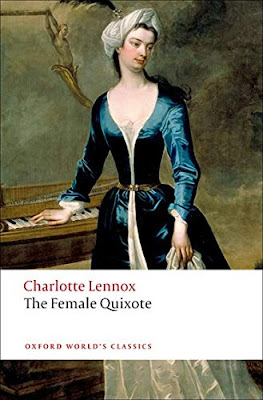Spin #32 Title: The Female Quixote
What a fun read this was! If you're looking for an 18th century novel that isn't too long or difficult, this is a good choice. It's still long -- but nowhere near the size of Tom Jones, or Pamela, or Clarissa. Published in 1750, it's just one of the many titles written by Charlotte Lennox, who was well-respected by the other major novelists of her day.
This story is a satirical farce; like the original Quixote, Arabella has read too many romances and believes them to be history, with interesting results. The books she has read would have been quite familiar to readers, and they aren't at all familiar to us, which puts us at a bit of a disadvantage. I found the web project Arabella's Romances to be helpful in this regard.
Arabella is a lovely and intelligent girl, but her father is a recluse and has brought her up on an isolated country estate, with no other relatives or friends to show her the world. He gave her free reign in his library, and her favorite reading consists of the 17th-century French romances (in bad translations!) that her mother enjoyed. Without a realistic context to compare them with, Arabella believes that every girl in the world must go through many adventures -- abductions, duels fought on her behalf, admirers silently dying of unrequited love -- before finally accepting marriage with a lover who conducts himself appropriately, namely killing a lot of rivals and abnegating himself at her feet.
When her father dies, it is his wish that she marry a distant cousin, Mr. Glanville, who is a good man who loves her, but is totally unfamiliar with romances and cannot understand the way she speaks and acts. Every time she sees an unknown man, she is certain that he's heard of her beauty and has come to abduct her, and the solution to this is to run away and put herself at the mercy of the first man she sees; he's guaranteed to be a helpful cavalier. She offends other girls by asking them to relate their adventures, or worse, by asking their maids to relate them. The well-spoken gardener must be a nobleman in disguise, and he must have been at the pond in order to throw himself in it to drown in despair, not in order to steal fish to sell on the side. And she bores everyone stiff with her constant talk of the divine Mandana, or the virtuous princesses Cleopatra and Julia, (If you can just get her off the topic of romances, she's an excellent and rational conversationalist, but it's not an easy job.)
Finally a sympathetic countess intervenes, and plants the idea that manners change over time, and what was usual two thousand years ago might not be appropriate for the modern day. When Arabella panics yet again over an imagined abduction and tries to swim across a river, a kind vicar finishes the job by convincing her that her beloved stories are fiction, not history.
It's a funny story, but it's also sympathetic to Arabella, whose problem is ignorance, not deliberate evil. I thought it was noteworthy that the people who are able to help her are those neither mock her nor get angry; they're the ones to make the effort to understand her point of view and kindly show her reality.
I'm glad this one came up as my Spin novel -- very fun!





I've never heard about this book, but it seems quite amusing.
ReplyDeleteCongrats for finishing it for CC Spin!
Thanks, Fanda!
DeleteI've never heard of this one, and it does sound like fun! Reminds me a little of Northanger Abbey. Thanks for putting it on my radar - I'll add it to my list!
ReplyDeleteThis comment has been removed by a blog administrator.
DeleteYes, I think Jane Austen got some ideas from Charlotte Lennox for sure!
Delete